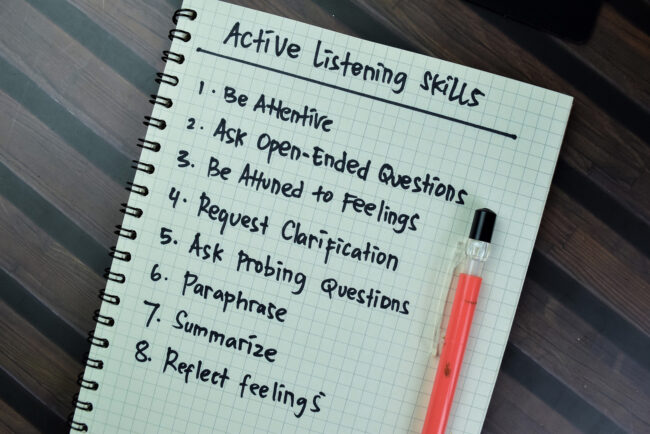How To Effectively Communicate With Clients In A Competitive Market
Business shaking hands. Successful businessmen handshaking after good deal. Finishing up meeting concept
Effective communication skills are necessary in today’s competitive real estate market, making successful communication essential to developing strong client relationships and closing deals. While communicating directly can present unique obstacles, this blog post will highlight some challenges while emphasizing the significance of creating long-lasting client relationships.
By actively listening and asking the right questions, you can gain valuable insights into your clients’ needs, motivations, preferences, and goals. This understanding becomes the foundation for effective communication throughout the client-agent relationship. It allows you to tailor your recommendations, provide relevant information, and ultimately deliver a personalized experience that exceeds their expectations.
Active listening requires giving your full attention to your clients, understanding their concerns, and gathering valuable information about their needs. Going beyond simply hearing, active listening involves engaging with each client while showing genuine enthusiasm for their goals and aspirations.

To actively listen, professionals should ask the right questions. By asking open-ended questions, you encourage clients to share more details about their preferences, motivations, and requirements. This can help you comprehensively understand their needs and enable you to provide tailored solutions.
Each client is unique, possessing their own motivations, preferences, and goals when purchasing or selling property. As a real estate professional, it is crucial to identify these factors so you can effectively communicate and serve them.
By effectively communicating your expertise and managing client expectations, you establish a foundation of trust and transparency. Clients will appreciate your honesty and feel more confident in their decision-making. Clear expectations help streamline the buying or selling process, minimizing misunderstandings and creating a smoother experience for you and your clients.
Clients rely heavily on the expertise and market knowledge of their professionals. Effective communication is necessary to build trust between parties and establish yourself as a reliable resource.
When communicating with clients, highlight your experience, qualifications, and understanding of the local market. Share relevant statistics, trends, and insights that demonstrate your knowledge and expertise. This instills confidence in your abilities and positions you as a trusted advisor who can guide clients through the complex real estate landscape.

Often, clients have high expectations and may be unaware of the current market conditions, such as low inventory or rapidly changing prices. Effective communication can help bridge this gap and align their expectations with the reality of the market.
Be upfront with clients about current market conditions, educating them on factors affecting property availability and pricing. Provide data and insights to enable them to comprehend market dynamics better so they can make informed decisions and adjust their expectations appropriately.
Set realistic timelines for property searches, negotiations, and closing processes. Clearly communicate the typical timeframes and potential challenges during each stage. This ensures that clients have a realistic understanding of the process and helps manage any potential frustrations or disappointments.
You demonstrate your commitment to excellent customer service and adaptability in a competitive market by being responsive. This level of availability and accessibility strengthens your client relationships, builds trust, and positions you as a reliable real estate professional.
To effectively manage client messages, consider implementing systems or tools to help you stay organized. This could include setting up email filters or using customer relationship management (CRM) software to track and prioritize client interactions. By staying on top of your communications, you can ensure that no client inquiries slip through the cracks.
Technology plays a pivotal role in communication today. Leveraging technology can boost your ability to remain relevant in the real estate marketplace. Utilize communication tools such as instant messaging or chat platforms to provide quick responses to client queries. These platforms allow real-time communication, enabling you to promptly and efficiently address client concerns.
Consider using video conferencing for virtual meetings and property tours. This technology allows you to connect with clients who cannot meet in person or are in different geographical areas. Virtual tours can provide a comprehensive view of properties and help clients make informed decisions without physically visiting each property.
Adapt your approach to match clients’ preferences and utilize clear and concise language to avoid misunderstandings. By doing so, you create a more personalized and effective communication experience. This strengthens your client connection and helps build trust, understanding, and successful outcomes.
Each client is unique and may have differing communication preferences. Adjusting your approach can dramatically enhance your ability to connect and build rapport with clients.
Some clients prefer formal and professional communication styles, while others prefer casual and friendly approaches. Pay attention to their communication cues and tailor your tone and style accordingly, whether through language, formality levels, or general demeanor in your interactions. Be mindful of which communication channels your clients prefer. You can ensure that messages reach clients effectively by using the channels that best suit each individual preference.
Real estate jargon and complex terminology can confuse clients and hinder effective communication. Strive to use simple and easily understandable language to convey your message. When explaining concepts, processes, or terms, break them down into digestible and relatable explanations. Use examples and visuals whenever possible to enhance clarity. By simplifying complex information, you empower your clients to make informed decisions and actively participate in the real estate process.
Keeping clients informed about market trends and new listings showcases your expertise and helps them make informed decisions. Providing progress reports during ongoing negotiations or transactions demonstrates transparency and builds trust. By implementing these practices, you establish yourself as a reliable and communicative real estate professional, positioning yourself for success.
Regular updates on market conditions and available properties demonstrate your commitment to providing valuable information and helping clients make informed decisions. Staying informed of market trends such as inventory levels, pricing structure, and interest rate shifts is vital to maintaining client relationships and positioning yourself as an authoritative resource. By sharing market insight with clients via regular emails, newsletters, or blog posts, you establish yourself as an informed source and keep them current on the current state of affairs.
Inform clients about new listings that match their criteria. Email alerts or personalized notifications are used to relay information to them promptly when a relevant property becomes available. This proactive approach demonstrates your attentiveness and dedication to helping clients find their ideal property.

Clients want to be kept informed about the progress of their deals and any updates that may affect their decisions. Providing progress reports reassures clients that you are actively working on their behalf and helps manage their expectations.
Keep clients updated on negotiations, offers, and counteroffers as they develop. Inform them of any roadblocks or challenges which arise during this process. Effective communication about progress, positive or negative, builds trust and transparency within the client-agent relationship.
Provide updates on important milestones, such as inspections, appraisals, and loan approvals. Ensure clients understand what to expect at each stage of the process and inform them of any potential delays or changes. By setting realistic expectations and providing regular updates, you minimize surprises and maintain open lines of communication.
Communicating openly about challenges and potential risks allows clients to make informed decisions and minimizes surprises. By consistently demonstrating these qualities, you position yourself as a reliable and trustworthy real estate professional, increasing your chances of success in a competitive market.
Communication requires openness and honesty to foster effective working relationships. To do so successfully, any potential obstacles or risks related to buying or selling real estate must be addressed head-on. Communicate openly with your clients about their challenges throughout the process. This could include potential delays, legal or financial complexities, or issues arising during inspections or appraisals. Being transparent about these challenges helps clients prepare mentally and emotionally, minimizing stress and surprises.
Discuss potential risks associated with specific properties or neighborhoods. Inform clients about known issues like flood zones, structural concerns, or zoning restrictions. Honesty about these risks allows clients to make well-informed decisions and ensures they are fully aware of the implications.
Always be truthful and forthcoming with information. If you don’t have an answer to a client’s question, admit it and commit to finding the necessary information. Avoid exaggerations or making promises that you cannot keep. You establish yourself as reliable and trustworthy by consistently demonstrating honesty and integrity.
Be upfront with your clients regarding any potential conflicts of interest or transactions in which you stand to benefit personally, such as having personal connections with any involved parties. Being transparent about these aspects of your role and any possible conflicts of interest demonstrates your dedication and prioritizes your best interests above all else.
Remembering and acknowledging important milestones or preferences shows that you value your clients as individuals and builds a deeper connection. Personalized messages demonstrate genuine care and attention, making clients feel heard and understood. Incorporating these practices can create a more personalized and meaningful client experience.
Try to remember and celebrate key moments in their lives, such as birthdays, anniversaries, or special achievements, with them by sending personalized notes or tokens of appreciation as reminders that you care beyond real estate transactions. Doing this helps foster deeper connections and build long-term relationships.
Pay close attention to your client’s preferences and use them in your interactions. For instance, if they are interested in particular property types or neighborhoods, take note of them and tailor recommendations accordingly. Showing that you remember and understand these preferences will show them that you’re actively listening and truly invested in helping them find what suits them.
Sending generic or templated messages can come across as impersonal and robotic. Instead, make an effort to craft personalized messages that show genuine care and attention to each client’s specific needs and circumstances.
When communicating with clients, address them by name and reference specific details from previous conversations or interactions. This personal touch helps create a sense of familiarity and shows that you value their individuality.
Tailor your messages to reflect each client’s unique situation. If a client is a first-time homebuyer, provide information and resources specifically geared toward their needs. If a client is selling a property, offer personalized advice on staging or marketing strategies. By customizing your messages, you demonstrate that you are invested in their success and willing to go the extra mile to meet their specific needs.
Clear communication is integral to your success in an increasingly competitive real estate market. Following these strategies can enhance your communication abilities and form stronger client bonds.
Effective communication is the cornerstone of a strong client-agent relationship. It helps build trust, foster understanding, and ensure clients feel informed and supported throughout the real estate process. In today’s fast-paced market, where clients have many choices, valuable communication sets you apart from your competition.
Let’s boost your lead gen.